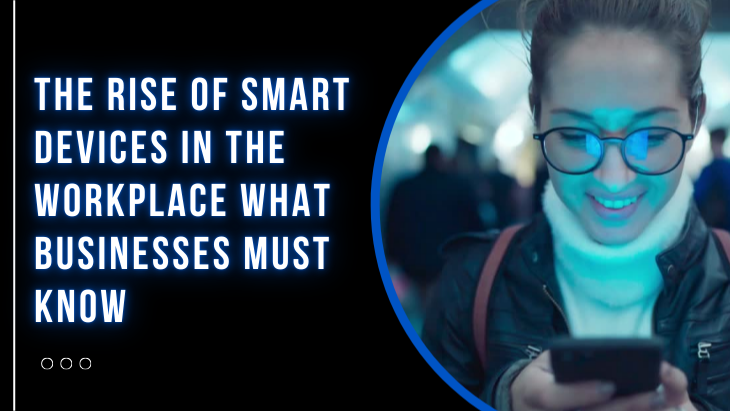The emergence of smart devices over the past few years has transformed how companies work, improving productivity, efficiency, and overall employee experience. From intelligent speakers to advanced communication systems, these devices are now becoming the norm in workplaces today. Integrated IT & Hardware Solutions As companies increasingly embrace digital transformation, it's essential for businesses to understand how to leverage integrated IT & hardware solutions to stay competitive. This article explores the growing impact of smart devices on the workplace and what businesses need to know to make the most of this technological shift.
The Growing Popularity of Smart Devices in the Workplace
Smart devices, initially found only in homes, have rapidly gained traction in the workplaces of the world. The growth of Internet of Things (IoT) technology has enabled it to become simpler than ever before for businesses to incorporate a multitude of smart devices into business processes. These devices provide enhanced automation, data aggregation, and real-time communication, making them indispensable resources for workplace efficiency improvement.From smart lighting and thermostats to voice assistants and hi-tech video conferencing tools, today's smart devices are revolutionizing the way that employees work together, share information, and get the job done. Integrated IT & hardware solutions are growing in popularity as they enable devices to communicate and work in harmony with each other, giving users a seamless experience.
Advantages of Smart Devices in the Workplace
The employment of smart devices in the workplace provides a variety of advantages, especially when coupled with integrated IT & hardware solutions. One of the greatest benefits is enhanced productivity. Smart devices automate mundane tasks, including scheduling meetings, office temperature control, and lighting systems management, which allows employees to concentrate on more strategic tasks.In addition, these tools enhance collaboration and communication. Video conferencing platforms, interactive whiteboards, and collaboration software have revolutionized remote and hybrid work patterns by enabling teams to collaborate more efficiently irrespective of their location. The capability to view real-time information and make better-informed decisions has also enabled workers to work smarter, not harder.Also, intelligent devices are responsible for more efficient workplace management and cost savings. Energy-efficient devices such as smart thermostats and lighting solutions enable businesses to reduce utility expenses, whereas devices that monitor and track equipment usage can result in fewer breakdowns and extended lifespans for office equipment.
How Integrated IT & Hardware Solutions Improve Workplace Efficiency
Integrated IT & hardware solutions are critical for companies that want to maximize the utilization of smart devices in the workplace. Integrated solutions enable various devices, software, and systems to communicate with each other seamlessly, providing a smooth experience for employees and employers. Integration provides a guarantee that devices can talk to each other, exchange data, and automate processes without the need for constant manual intervention.For instance, an integrated intelligent system in a conference room may automatically change lighting, temperature, and audio/visual conditions according to the users' schedule or preferences. This integration obviates the necessity of workers manually setting each device, thus saving time and minimizing the risk of errors.In addition, IT systems used to handle security, access, and data privacy are essential when incorporating smart devices. Companies should make sure that their integrated solutions are secure and conform to applicable regulations to ensure sensitive information is not accessed without authorization.
The Challenges of Adopting Smart Devices in the Workplace
Although the proliferation of smart devices presents several benefits, businesses should also take into consideration the difficulties that are involved in adopting these technologies. One of the primary difficulties is the investment needed to install smart devices and IT & hardware integrated solutions. With regard to the size and complexity of the workplace, the initial outlay may be substantial. Yet companies need to see these expenditures as long-term investments that will ultimately result in cost reductions and enhanced productivity.Another issue that companies are confronted with is the integration of the new smart devices into current systems. Most organizations have legacy IT infrastructure, and integrating new devices into these systems can be complex. It's important to ensure compatibility of the technology with current systems and train employees on the use of the new devices appropriately.Finally, there are issues surrounding data security and privacy. With the increased utilization of smart devices, there is more data being stored and transferred over networks. Companies should install robust cybersecurity systems and adhere to privacy legislation to safeguard their companies' as well as employees' confidential data from possible threats.
Best Practices for Implementing Smart Devices in the Workplace
In order to effectively deploy smart devices in the workplace, companies should adhere to some best practices. First, they should start by assessing their unique needs and choosing devices that fit their objectives. For example, a company that values communication and collaboration may find it worthwhile to invest in high-end video conferencing systems and smart meeting room technology.
Conclusion
Praise-group The emergence of smart devices in the workplace is revolutionizing the way companies work, providing many advantages in productivity, communication, and cost reduction. By implementing integrated IT & hardware solutions, firms are able to have their smart devices cooperate harmoniously, simplifying processes and boosting overall efficiency. Businesses need to be cautious about the risks involved in embracing new technologies, though, and take measures to lower security and integration-related risks. With the proper strategy, intelligent devices can be the key to determining the future of work, leading innovation, and gaining a competitive advantage in the continuously changing digital environment.





Leave a reply